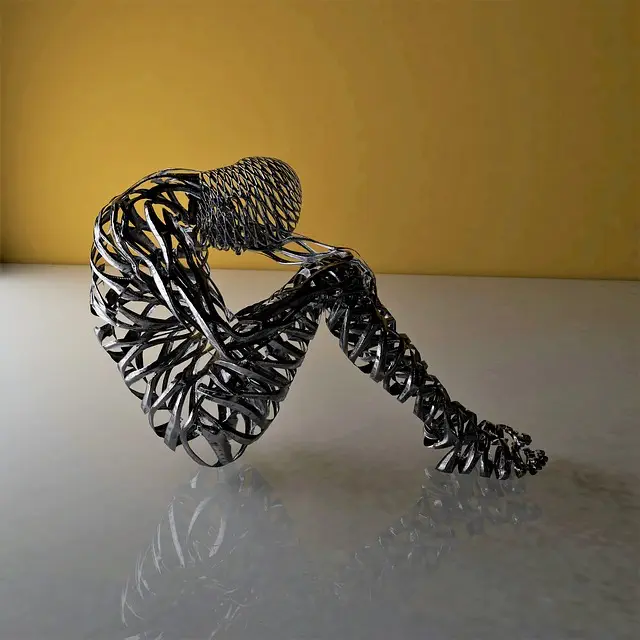Kratom, from the Mitragyna speciosa tree, is being explored as a complementary treatment for managing symptoms of anxiety disorders, particularly for its muscle-relaxing benefits. Its compounds, mitragynine and 7-hydroxymitragynine, affect brain neurotransmitter systems associated with mood and pain perception, potentially easing the muscular tension often experienced by those with anxiety and stress. While it shows promise as an adjunct therapy, it's crucial to approach its use with caution due to individual differences in response. Kratom acts on mu and delta opioid receptors to reduce muscle spasticity and pain, but it should be used alongside established treatments and under medical supervision, given its legal status and potential interactions with other medications. For effective management of anxiety disorders, a personalized treatment plan that includes cognitive-behavioral therapy (CBT), support groups, and medication, alongside judicious consideration of alternative therapies like kratom, is recommended. This approach ensures a balanced and comprehensive strategy that leverages both conventional and alternative treatments with professional guidance for the best outcomes. Always consult healthcare providers before integrating kratom into any treatment regimen.
Exploring the complex landscape of anxiety disorders, this article unravels the potential of Kratom in managing symptoms, particularly focusing on its role in muscle relaxation. We delve into how Kratom can be a component within comprehensive support systems tailored for individuals grappling with these conditions. Subsequently, we discuss integrating Kratom into holistic strategies aimed at alleviating anxiety and associated muscle tension, offering valuable insights for those seeking natural solutions to improve their well-being.
- Understanding Anxiety Disorders and the Role of Kratom in Management and Muscle Relaxation
- Comprehensive Support Systems for Individuals with Anxiety Disorders
- Integrating Kratom into a Holistic Approach for Anxiety and Muscle Tension Alleviation
Understanding Anxiety Disorders and the Role of Kratom in Management and Muscle Relaxation

Anxiety disorders represent a spectrum of mental health conditions characterized by excessive worry, fear, and emotional distress that can significantly impair daily functioning. These disorders, including generalized anxiety disorder, panic disorder, social anxiety disorder, and others, are complex and multifaceted, often requiring a comprehensive approach to management that includes therapy, lifestyle modifications, and in some cases, pharmacological interventions. In this context, Kratom has gained attention as a potential adjunct treatment for managing symptoms associated with anxiety disorders. Native to Southeast Asia, Kratom is derived from the leaves of the Mitragyna speciosa tree and has been traditionally used for its stimulant and sedative properties. Its active compounds, mitragynine and 7-hydroxymitragynine, are thought to interact with various neurotransmitter systems in the brain, including those involved in mood regulation and pain perception. One notable application of Kratom is in muscle relaxation, where it has been reported to provide relief from muscular tension and discomfort, which often accompanies anxiety and stress. The mechanism by which Kratom exerts its muscle relaxant effects is believed to be through its action on mu and delta opioid receptors, leading to a reduction in muscle spasticity and an alleviation of pain. However, it’s crucial for individuals to approach the use of Kratom with caution, as it can have varying effects depending on dosage and individual sensitivity. Additionally, due to the complex nature of anxiety disorders, Kratom should be considered as a supplementary measure alongside conventional treatments rather than a standalone solution. The use of Kratom for any condition should be discussed with a healthcare provider to ensure safety and efficacy, especially given the regulatory status of Kratom in different regions and the potential for interactions with other medications. Understanding the nuanced role of Kratom in anxiety disorder management requires careful consideration of both its benefits and potential risks, ensuring that individuals receive informed guidance and support tailored to their unique needs.
Comprehensive Support Systems for Individuals with Anxiety Disorders

Individuals grappling with anxiety disorders often require a multifaceted approach to manage their condition effectively. Comprehensive support systems encompass a variety of therapeutic modalities and interventions tailored to each person’s unique needs. These systems may include cognitive-behavioral therapy (CBT), which helps individuals identify and change negative thought patterns and behaviors. Additionally, support groups provide a safe space for sharing experiences and coping strategies with peers who understand the challenges of living with an anxiety disorder. Medications prescribed by healthcare professionals can also be integral in managing symptoms.
In conjunction with traditional treatments, alternative options such as kratom have gained attention for their potential role in anxiety disorder support. Kratom, derived from the leaves of the Mitragyna speciosa tree, is known for its effects on muscle relaxation and mood elevation, which can be beneficial for those experiencing muscle tension and mood swings associated with anxiety. It’s important to approach such alternatives with caution, as the efficacy and safety of kratom are subjects of ongoing research and regulatory consideration. Users should only consider kratom under the guidance of a healthcare provider, ensuring proper dosing and monitoring for any adverse effects. A balanced support system respects the individual’s preference for integrative approaches while maintaining a focus on evidence-based practices and the oversight necessary to safeguard their well-being.
Integrating Kratom into a Holistic Approach for Anxiety and Muscle Tension Alleviation

Kratom, a mitragynine-containing plant, has garnered attention for its potential role in managing symptoms associated with anxiety and muscle tension. Within a holistic framework, kratom can be an integrative component, complementing traditional therapy methods. Its alkaloid profile, particularly the presence of 7-hydroxy mitragynine, contributes to its anxiolytic properties, which may help individuals experiencing anxiety disorders find a sense of calm. Moreover, the analgesic effects of kratom are well-documented and can be beneficial for those suffering from muscle tension often accompanying stress and anxiety. When used as part of a comprehensive treatment plan that includes lifestyle changes, therapeutic activities, and professional psychological support, kratom may aid in alleviating physical manifestations of anxiety, promoting overall well-being.
Incorporating kratom into a holistic approach requires careful consideration, as its use should be guided by medical advice due to its potency and the need for precise dosing. It is essential to consult with healthcare providers to ensure safety and efficacy. Additionally, individuals considering kratom as part of their regimen must understand the importance of maintaining a balanced lifestyle that includes regular exercise, proper nutrition, and adequate sleep, all of which contribute to muscle relaxation and mental health. By aligning kratom use with these supportive practices, individuals may experience a more harmonious balance between mind and body, potentially leading to significant improvements in managing anxiety and associated muscle tension.
In conclusion, anxiety disorders present complex challenges that require multifaceted support systems. The integration of Kratom within a holistic therapeutic regimen for muscle relaxation and overall anxiety management has shown promise. It is crucial for individuals with anxiety disorders to have access to comprehensive support, including medical guidance when considering Kratom as an adjunct treatment option. By understanding the intricacies of these disorders and employing a supportive approach that includes natural alternatives like Kratom, healthcare providers can play a pivotal role in enhancing the quality of life for those affected. It is through such integrated and empathetic care that individuals with anxiety disorders can navigate their journey towards wellness more effectively.






